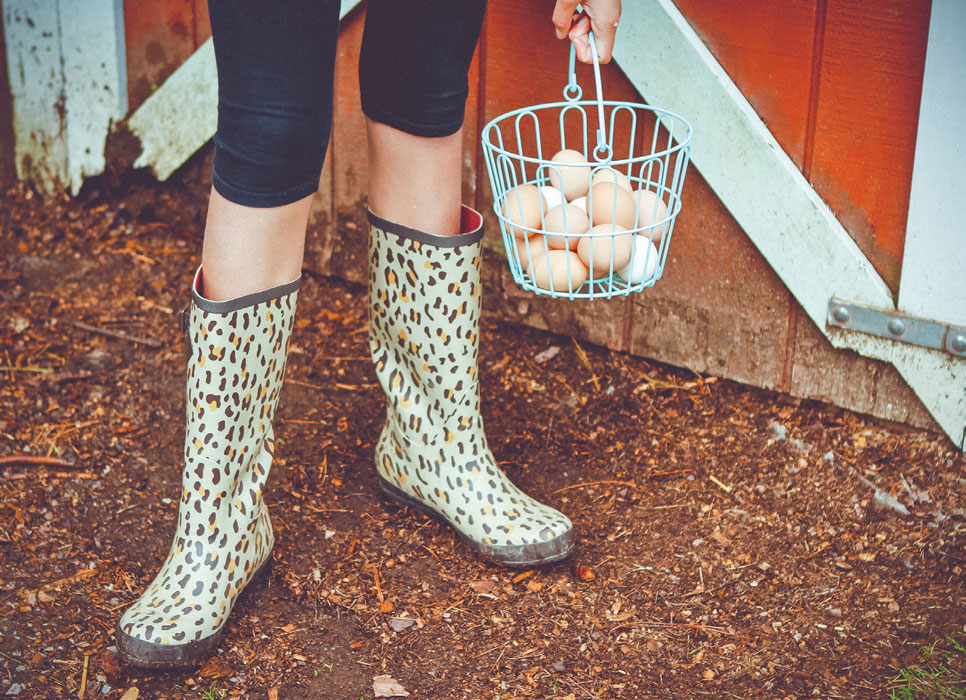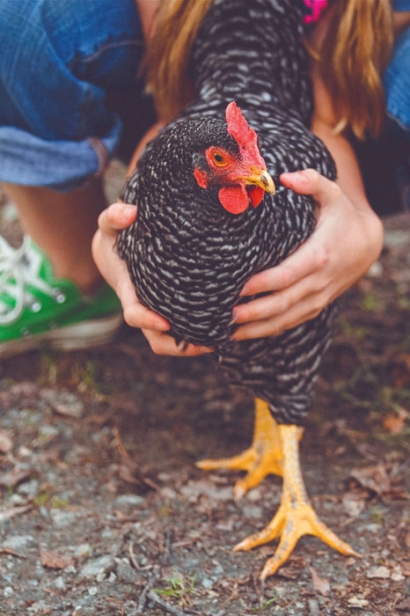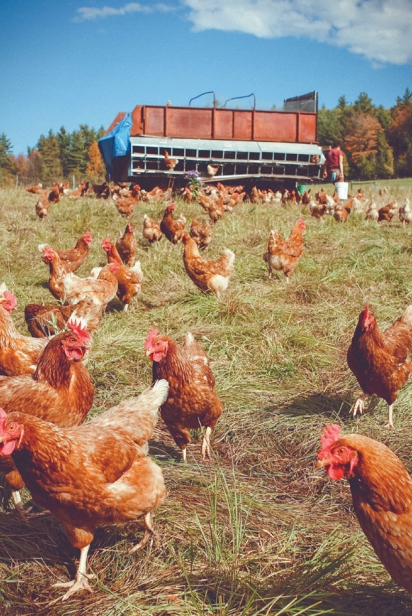The Chicken Chronicles: Keeping Hens Can Produce a Few Cackles
Keeping chickens is a growing trend in Vermont. Though the state doesn’t keep any official statistics, the Vermont Bird Fanciers Facebook page has 755 members, and it would seem every other neighbor has a coop. While some grow the birds for meat, many keep them for eggs and some people keep them simply because they are good company.
Over the years, I have heard many chicken stories, often gruesome but sometimes sweet and touching. I have started a file called “The Chicken Chronicles” with the adventures and mishaps of the people who tend them. If you presume that keeping chickens is mundane, these stories will indicate otherwise; they contain tales of blood, romance and just a little bit of nudity.
The responsibility of keeping birds healthy and comfortable is a serious one. How humans go about doing that can sometimes be quite funny.
TACKLING THE UNKNOWN … IN THE BUFF
If you start keeping chickens, you have to accept the fact that you will be interacting with a great deal of wildlife as a result. Bobcats, bear, raccoons, fox, raptors and all manner of weasels that might otherwise keep to their own turf will be drawn to the coop for an easy meal. Protection for the birds, especially at night, is essential—but even the strongest enclosure won’t ensure their safety. Like children, chickens offer their rewards but a good night’s sleep isn’t one of them.
My friend Dave, now of Craftsbury, recounts a story from a hot summer night when he had 100 meat birds in the yard. Dave is a solidly built timber-framer and farmer with a long, dark beard. For as long as I have known him, I have called him Big Dave because he reminds me of the statue of Paul Bunyan featured in the movie Fargo. Dave and his partner, Leah, raised the birds for meat and had a permanent coop with posts in ground that held up poultry netting and a small house for roosting. He describes his evening thus:
It was a hot summer night and Leah was away, so he was enjoying a bachelor dinner, which he describes as “four beers and a sausage.” Since he is inclined to get up around 4am to start his day, he went to bed at 9 and, given the oppressive heat, slept au naturel in his bed on the second floor. At about 1am, he awoke to squawking chickens. He got up and shined a flashlight from the window but couldn’t see anything in the darkness. Figuring the predator was still lurking, he grabbed a shotgun, put on boots and a headlamp with nothing in between and went outside to the coop.
Shining the flashlight inside, it appeared the birds looked fine and the fencing was intact. He gave the darkness a big “Hmff” and went back inside to bed. Two hours later there was more squawking and ruckus. Wearing nothing more than a scowl, he went out again with boots and headlamp. As before, he shined the light but didn’t see anything so he returned to the house.
At dawn, Dave awoke feeling groggy and grouchy from the poor night’s sleep. He poured some coffee and wandered out to the coop (fully clothed, finally) for morning chores. While he was dispensing grain and filling water troughs, he spotted a dead chicken in the coop. A gruesome sight since the predator had grabbed the bird from the outside of the fence, pulled it to edge and chewed off its wing.
Dismayed, Dave took the carcass out of the coop and continued filling the water troughs. It was then he saw a chicken walking oddly. On closer inspection, the bird had the majority of its breast eaten but it was still alive, no doubt a victim of the same predator. He had no choice but to kill it. Thinking the gun was a bit much for the job, he walked back inside to find a more suitable tool but could only find a sickle. Wanting to end the bird’s misery as fast as possible, he decided to use the sickle for lack of other available tools.
In a tired stupor he returned to the coop and found the half-eaten chicken. Holding on to the bird he explained, “I raised the sickle up over my head, swung it, completely missed. The next thing I see is the blade flying across yard. The chicken was still alive but the blade was gone.” Hanging his head in fatigue, he dutifully searched for the blade in the tall grass and eventually the mercy killing was successful.
While the chickens suffered a worse night than Dave, he recounts the story as one that gives him pause whenever he considers getting a new round of meat birds. Since then, he and Leah try to make sure all their birds are secured in the coop at night. To the best of my knowledge, that was the last of the naked stakeouts.
CHILDREN AND CHICKENS
Chickens can work their way into children’s hearts as much as a dog or cat. My friend Cindy, from Underhill, has a 12-year-old daughter, Ava, who can calm any rattled chicken to near-purring state. (They call her the Chicken Whisperer.) The family has kept laying hens for over a decade, and they give all their chickens adorable names such as Broody Bon Bon, Flora Bella, Chicker Biddy and Peeper Diddle. Ava interacts with the chickens and plays with them like any other pet, taking them on the swings with her and carrying them around under her arm. In response, the chickens follow her around and visibly perk up when she goes out to release them from the coop. She and her 9-year-old sister, Fiona, have learned compassion and responsibility by taking care of the chickens over the years.
NOT ALL CHICKEN-CHILDREN RELATIONSHIPS END WELL, HOWEVER.
My roommate from college felt similar about her chickens when she was a child but theirs were not for eggs. Ginger grew up in a rural area of Alberta, Canada. Her father deserted them when she was young, leaving her mother with four children and no money. For that first year after he left, they had to survive on what they grew on the farm, including the chickens they raised for meat.
Ginger told me that the summer after her father left, the local evangelical group would come out to the farm and try to sweep her family into their church. Her mother wanted nothing to do with them but they continued to stop by, uninvited. Exhausted by the farm and four kids, the church group only added to the stress in her life but with little support, she felt powerless to stop them. In the meantime she got a job and the family harvested what they could for food.
Come fall it was time to slaughter the chickens. Ginger was only 5 years old at the time and, though she may have been aware the chickens were eventually going to be dinner, she was still a little girl who also liked to give cute names to her feathered friends. The day had arrived, and so her mother took an ax and began dispatching the chickens.
Little Ginger found her favorite chicken, headless but otherwise intact, and picked it up for one last cuddle. It was at that point that the church group came down the driveway to once again try to convert her mother. They were greeted by 5-year-old Ginger, covered in blood, holding a headless chicken and staring up at them with tears in her eyes. Ginger claims they took one look at her, turned around and never came back again.
It turned out that having the strength to do what needed to be done for her family’s survival resulted in regaining control over her life in another area—killing two birds with one stone, so to speak.
THE CHARMER
Not all chicken stories are bloody. Jennifer, who lives in Fletcher, shared a story about a rooster that was small in stature but big on charm. Jennifer has been keeping laying hens for many years. She and her husband, Noel, had considered getting a rooster but had seen how brutal roosters can be to their flock, jumping on their backs and pecking out feathers. If they were ever to get a rooster it had to be gentle, but how would one ever know?
On a trip to her home state of Massachusetts eight years ago, they stopped by Nevins Farm, which is an MSPCA rescue center where they saw many roosters without a home. One was a little English game bird that was about a third the size of Jennifer’s large Rhode Island Reds and Barred Rocks. She decided to take a chance with it, gave a donation, put him in a box with some hay and drove the four hours home to Vermont. She named the little guy Orin.
Jennifer was unsure how Orin would do with her girls. Would he be just as aggressive as larger roosters? Or would the hens even accept his scrawny presence in their flock? She describes their first meeting:
“When we got home, I didn’t know what to expect. I opened the box and he jumped out and looked around at 14 huge ladies and no other roosters to compete with. Right away, it was clear he thought he had died and gone to heaven.”
Orin proceeded to charm the hens and the family. He was gentlemanly and playful. Jennifer says, “He would ride around on their backs, which never bothered them but if one ever got tired she would gently tip him off to the ground. And he had a little chirp he would make to tell his flock if he found a source of bugs that sounded exactly like, ‘Alert. Alert.’”
Though he was too small to perform any reproductive duties with his larger charges, he would still strut like the rooster he was.
Jennifer recalls, “Sometimes he would make a grand gesture with one wing and extend it like a magician with a cape as if to say, ‘The Magnificent Orin has arrived.’” Orin lived eight happy years with his girls and died peacefully in the yard a few months ago. Jennifer is still sad about his passing but there is no doubt that after his rescue, Orin lived as good a life as a rooster could hope for.






